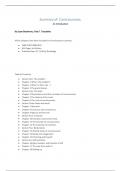Resume
Summary Consciousness - Blackmore - 3rd edition - 2018
- Cours
- Établissement
- Book
Summary of: Consciousness, An Introduction By Susan Blackmore, Emily T. Troscianko All the chapters have been included in this exhaustive summary.
[Montrer plus]




